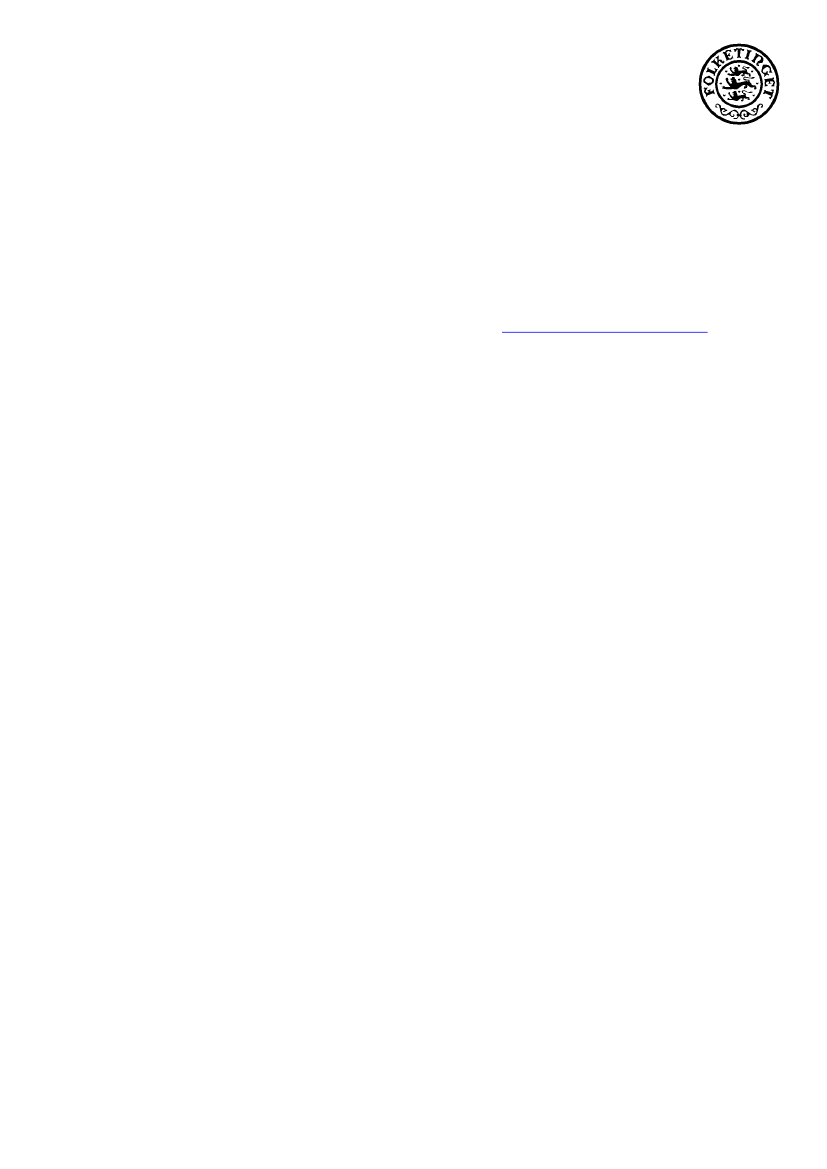Det Udenrigspolitiske Nævn 2004-05 (1. samling)
UPN Alm.del Bilag 46
Offentligt
Folketinget1. Udvalgssekretariat
17. januar, 2005
J.nr. 220/DIMF
Til medlemmerne af Det Udenrigspolitiske Nævn samt stedfortrædere
Information om “Kurdistan Referendum Movement”Informationen om K er hentet fra bevægelsens hjemmeside:www.kurdistanreferendum.orgPå hjemmesiden findes også flere artikler om bevægelsen.1
.
About Kurdistan Referendum Movement
Kurdistan Referendum Movement is a peaceful, non-violent, democratic movement of the people ofKurdistan for self-determination.Its mission is to achieve right of self-determination for the people of South Kurdistan through refer-endum or other internationally-recognised legal peaceful democratic means.KRM is a broad democratic non-partisan non-religious association of networks of groups and indi-viduals who campaign for Kurdistan's self-determinationIt aims to represent the popular movement of Kurdistani people in South Kurdistan for self-determination.The Association is based on stressing the right of every Kurdish individual to have a voice in deter-mining the future of South Kurdistan.The strategy of the association focuses around educating and empowering every individual in SouthKurdistan as well as Kurdistani people in Diaspora to effectively campaign for and participate in alllocal, national and international decision-making processes which affect the current de facto inde-pendent status of South Kurdistan and the future of Kurdistani people.The Association's methodology is based on ensuring the right of self-determination through the legalinternational mechanism of referendum to give the Kurdistani people the opportunity for self-determination.
2. The Draft Constitution of Kurdistan Referendum Movement (KRM)1.0 Name & DefinitionThe name of the Association is Kurdistan Referendum Movement [KRM] (hereinafter referred to asthe Association). It is a peaceful, non-violent, democratic movement of the people of Kurdistan forself-determination.
1
2.0 Mission:To achieve right of self-determination for the people of South Kurdistan through referendum orother internationally-recognised legal peaceful democratic means.3.0 Principles3.1 KRM is a broad democratic non-partisan non-religious association of networks of groups andindividuals who campaign for Kurdistan's self-determination3.2 It aims to represent the popular movement of Kurdistani people in South Kurdistan for self-determination3.3 The Association is based on stressing the right of every Kurdish individual to have a voice indetermining the future of South Kurdistan3.4 The strategy of the association focuses around educating and empowering every individual inSouth Kurdistan as well as Kurdistani people in Diaspora to effectively campaign for and participatein all local, national and international decision-making processes which affect the current de factoindependent status of South Kurdistan and the future of Kurdistani people.3.5 The Association's methodology is based on ensuring the right of self-determination through thelegal international mechanism of referendum to give the Kurdistani people the opportunity for self-determination.3.6 The Association works to promote and co-ordinate opinions, initiatives, organisations and insti-tutions that struggle for and/or contribute to the achievement of right of self-determination.3.7 The Association considers struggle for free expression, real democracy, social justice and civilsociety in South Kurdistan as an essential part of the struggle of South Kurdistani people for self-determination.3.8 Considering the right of self-determination as inalienable right of nations and individuals, KRMwill consider any decision, agreement, constitution and any other administrative arrangement affect-ing South Kurdistan illegal and illegitimate unless the South Kurdistani people will have voted on itin a general UN-sponsored referendum.3.9 In all its activities and international contacts, KRM will present moral, legal, humanitarian, his-torical, geographical and ethnic grounds for self-determination for South Kurdistani people.3.10 The final goal of the Association is attainment of self-determination through referendum orother peaceful legal democratic means and the Association will continue its campaign and activitiesuntil this goal is achieved.3.11 KRM is a movement and not a party. It will not work for assuming power or forming a gov-ernment. Its sole aim is to enable people to work for their own self-determination.
4.0 VALUES4.1 Democracy: Democracy's essence is the ability of people to peacefully change their governmentthrough elections. This basic understanding of democracy by people is vital for their ability to par-ticipate in decisions affecting their lives and destiny.4.2 Equal opportunities: Equal opportunities for education, employment, enterprise, property owner-ship, free expression and political participation for all individuals are vital for establishing a healthycivil society. We believe that a system based on tribal patronage and personal power contradicts adundermines civil society and democratic principles.4.3 Dialogue and free expression: KRM believes in freedom of expression in absolute terms. Webelieve in diversity of ideas, opinions and approaches. Dialogue, debate, peaceful competition, andrejecting violence and extremism, are the means that should prevail in society to solve problems anddifferences.4.4 Respect for individual roles and initiatives: We respect the dignity of every individual and rec-ognise the potential of every individual to become leaders and creators. We strive to ensure that allindividuals from all strata of Kurdistani society have voices and conscious roles as creators in soci-ety and contributors to political processes.4.5 Role of women: Women are the essence of social sustainability and political and economic pro-gress. KRM will ensure that women will play a leading role in the movement.
5.0 OBJECTIVES5.1 To empower every Kurdistani to have a voice in deciding their future through setting up referen-dum committees in Kurdistan and among Kurdistani people in Diaspora.5.2 The advancement of the education, awareness and training of Kurdish people to empower theirparticipation in community leadership, political dialogue, democratic elections and decision makingprocesses.5.3 To work for ensuring the right of free expression for Kurdish masses and individuals everywhereand to establish free non-partisan media including an independent satellite TV channel in Europe.5.4 To present, promote, organise, provide, manage and produce, dramatic and literary improvisa-tions, films, broadcasts, concerts, musical pieces, entertainment's, newspapers, magazines, books,exhibitions, tutorials, seminars, courses and workshops, whether on any premises of the associationor elsewhere.5.5 To work with international human rights organisations, democratic organisations, peace move-ments, international NGOs, conscientious individuals, liberal thinkers, etc to promote the Referen-dum Movement, the Kurdish question and the right of Kurdish people to self-determination throughpeaceful and democratic means.
5.6 To promote the Referendum Movement, the Kurdish question and the right of Kurdish people toself-determination by approaching the UN and its various agencies, world parliaments, civil societyinstitutions, world media, and world public opinion through whatever available and possible legalmeans.5.7 To organise world-wide Kurdistani campaigns to defend the human rights, democratic rights andright of Kurdistani people to self-determination in any part of Kurdistan.
6.0 STRUCTURE6.1 Philosophy:The structure of KRM is simple and reflects its simple philosophy which is: a. Thepeople of Kurdistan have inalienable right to self-determination. B. The people of Kurdistan aremade up of individual Kurdistanis C. Therefore every Kurdistani individual should have a voice indeciding the future of Kurdistan 4. Referendum movement is the forum, the network and the asso-ciation which will enable every Kurd to have a voice, and it will co-ordinate their voices and re-sources and will lead campaign of self-determination until it will achieve its aims.6.2 Decentralisation:The structure of KRM will be an extremely decentralised structure as follows:1. Every two Kurds and more in any part of the world can forma referendum committee as long as they believe in the aims, independence and philosophy of KRM.2. In large cities (in Kurdistan and abroad) as many referendum committees as individuals want andinitiate can be formed.3. Each referendum committee will coordinate and network with other committees through anelected representative irrespective of the numerical size of the committees.4. The representatives of referendum committees in any village, town and city (in Kurdistan) andany country (abroad) will form Higher Referendum Committee (HRC) in that country.5. HRCs will coordinate and network with other HRCs in the world through an elected representa-tive.6. The elected representatives of HRCs will also play the role of the co-ordinator of HRC in that cityor country.7. HRCs will also elect a spokesperson who can be the elected representative or another person.8. The ordinary members of all Referendum Committees in any village, town, city or any country(abroad) will become the General Referendum Council (GRC) in that village, town, city and coun-try.9. Higher Referendum Committees will be responsible to their General Referendum Councils.10. The elected representatives of HRCs will form the International General Council of KRM. (IGC-KRM]11. The International General Council of KRM will elect two spokespersons in Kurdistan and twointernational spokespersons: one in Europe and one in North America.12. The RCs and HRCs are expected to discriminate positively to allow a very active and substantialrole for women and young people.6.3 Centralisation and Co-ordination of decisions and activities1. Effective communication and co-ordination will be conducted by representatives of HRCsthrough telephone, email, Paltalk and video conferencing meetings and conferences.
2. Any RC or HRC can suggest an idea, proposal or plan of action and submit it to other HRCs.3. The KRM will have a centre in South Kurdistan, a Centre in London, a Centre in North America,a Centre in Scandinavian Countries and a Centre in Russia and/or Eastern Europe. New Centres canbe set up as necessary.4. All suggestions and action plans submitted by HRCs should be submitted to these centres.5. Each Centre will identify a person for co-ordination who will also be its spokesperson.6. At the first stage of KRM only independent people who are not affiliated to political parties canbe members of the RCs and HRCs.7. Elected representatives are expected to be able, active, honest, intellectual people who can play aneffective role in representing and promoting KRM's aims, independence and philosophy.8. Any political party, cultural and community organisation, community centre and network thatbelieves in KRM's aims, independence and philosophy, can affiliate to KRM and identify a repre-sentative to co-ordinate with KRM's centres.9. Representatives of affiliated political parties will be consulted and invited to all KRM's forumsand activities.10. HRCs in any country in the world will work to set up legal advisory committees (from foreigninternational experts) and parliamentary committees to support KRM's campaigns and Kurdistan'sself-determination.11. The priority of KRM is to organise national (Kurdistani) and world- wide peaceful campaignsand programmes to promote self-determination for Kurdistani people. Any issue that will negativelyaffect this principal aim will not be discussed at committee meetings.12. Introduction of any religious, sectarian, regional, partisan and tribal ideas and issues to KRM istotally prohibited.13. RCs in each country will organise annual general meetings14. KRM Centres will work together to organise an international conference to promote self-determination in South Kurdistan as soon as possible.15. KRM Centres will from time to time identify/elect spokespersons on behalf of KRM in Kurdi-stan and internationally.
Ditte Fallesen1. Udvalgssekretariat





